How to use AI in eCommerce: 7 Strategies to Get Success
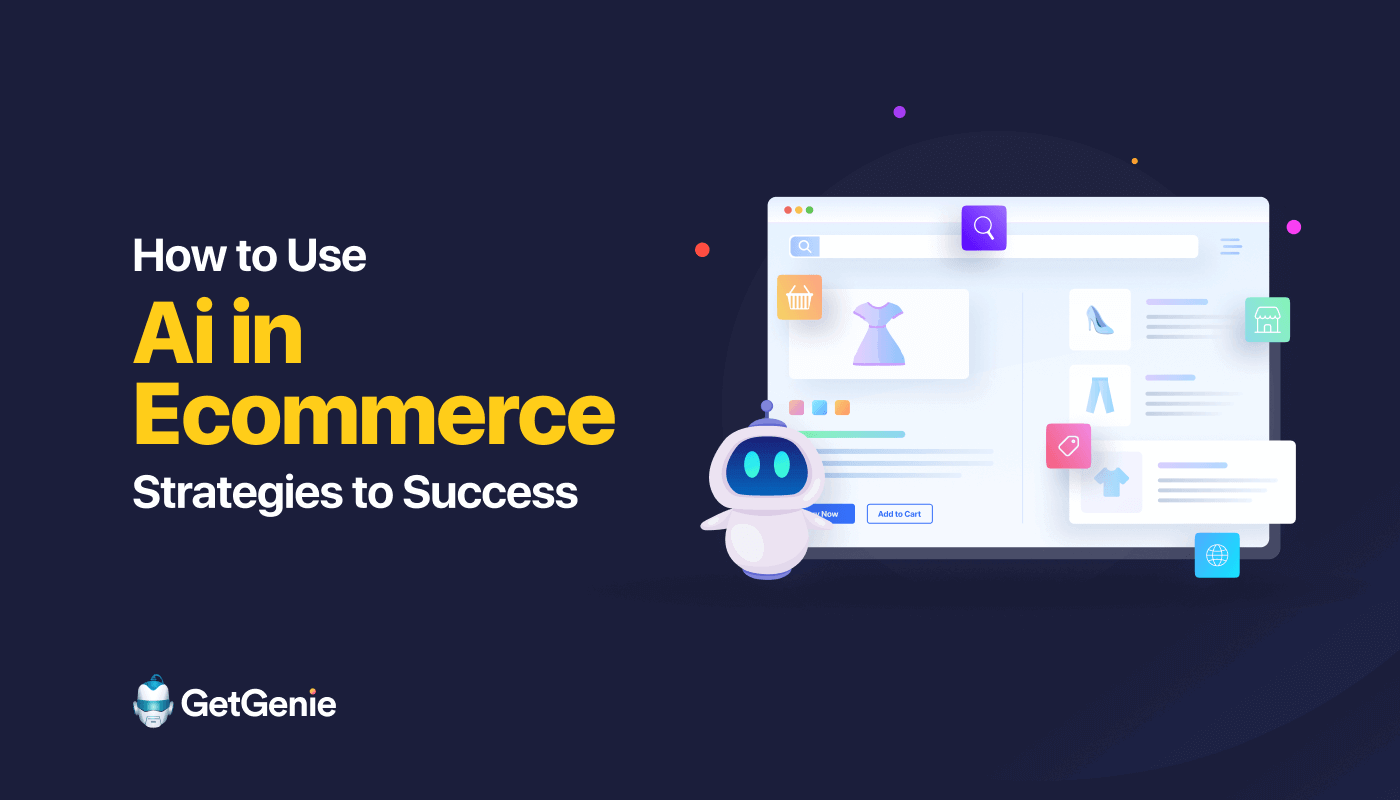
Artificial Intelligence (AI) has opened new doors of opportunity for eCommerce businesses.
But the question is, “How to use AI in eCommerce strategically” in your business operation? Well, AI can be utilized from market research to automate customer support.
In this blog post, we’ll explore the 7 proven strategies to use AI in eCommerce to significantly enhance customer experience, streamline operations, and boost sales.
- Understanding AI in eCommerce
- How to use AI in eCommerce: Use Cases
- 3 Examples of AI Technology in eCommerce
- FAQs
- Final Words
Understanding AI in eCommerce
Artificial Intelligence (AI) in eCommerce refers to the application of advanced algorithms and machine learning techniques to streamline and enhance various aspects of WooCommerce website operations.
For instance, generating product descriptions, updating product prices, recommending products, assisting customers with live AI chatbot, and more.
Recent studies reveal that around 84% of eCommerce enterprises are either actively integrating AI solutions into their operations or have prioritized doing so.
So, as a shop owner, comprehending the significance of AI in eCommerce is crucial to success in business.
Benefits of using AI in eCommerce
- Enhancing customer satisfaction with personalized shopping experiences.
- Optimizing inventory efficiency using predictive analytics.
- Boosting sales through recommendations and targeted marketing campaigns.
- Saving time and costs by automating routine tasks, allowing a focus on strategic decisions.
- Implementing an agile framework in response to market trends and customer preferences.
How to use AI in eCommerce: Use Cases
Incorporating AI in an eCommerce website as a powerful tool rather than a standalone solution. Let’s discover the 7 use cases of AI for your e-commerce website.
1. Market Research and Competitor Analysis
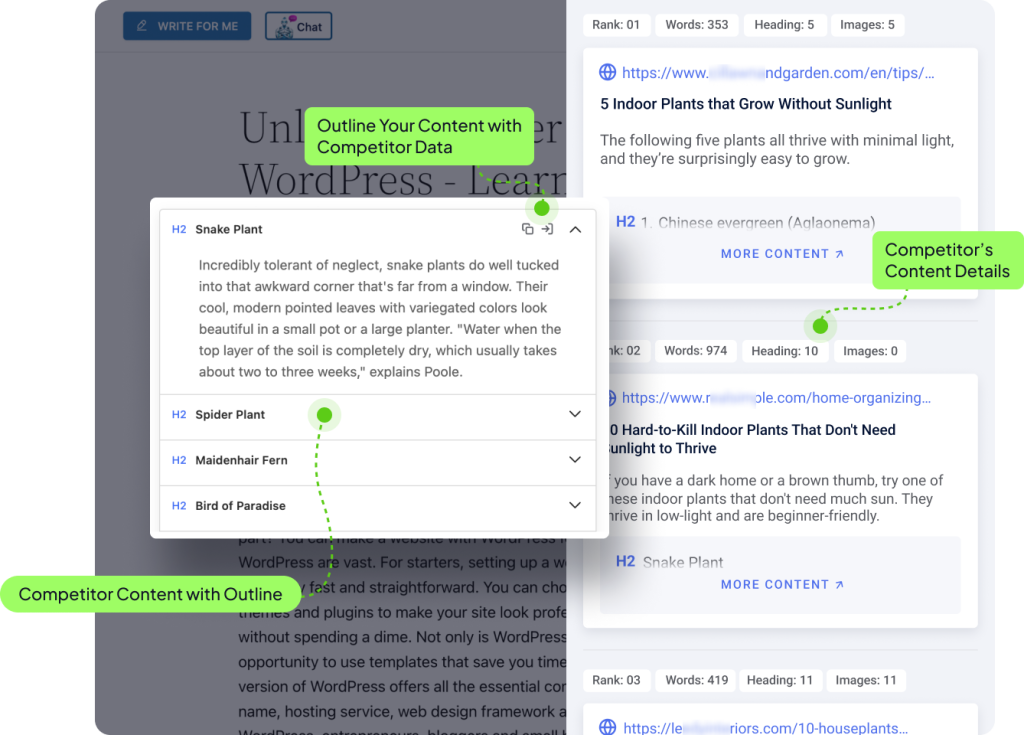
From targeted customer insights and head-to-head competitor analysis, AI empowers e-commerce businesses with data-driven strategies for success.
✔ Targeted Customer Insights
- Utilize AI algorithms to analyze vast datasets.
- Identify specific customer demographics, preferences, and behaviors.
- Enable a more targeted approach in marketing strategies and product offerings.
✔ Competitor Analysis
- Scan competitor websites, social media, and pricing structures.
- Provide valuable insights into market trends, customer sentiment, and competitive positioning.
- Inform strategic decision-making and help maintain a competitive edge.
✔ Product and Service Selection
- AI-driven analytics can assist in determining the most viable products or services for your eCommerce business.
- Analyze market demand and identify potential gaps or niches.
- Present lucrative opportunities for business growth.
2. Building eCommerce Websites using AI Builders
After comprehensive research, you can use AI website builders to design dynamic shop websites. These AI tools leverage machine learning to analyze design trends, user preferences, and industry standards. This results in the automatic generation of visually appealing and user-friendly eCommerce websites, saving time and resources.
Here’s how you can use AI builder tools to design a dynamic and functional website:
✔ Choose an AI-powered Builder
- Research and select a suitable AI-powered website builder based on design capabilities and user-friendliness.
- For example, Wix ADI uses AI to analyze your preferences and content and automatically generates a unique website design.
✔ Customize Design Elements
- Utilize AI for design analysis to automatically generate visually appealing website elements.
- Choose and customize templates to reflect your brand identity.
✔ Implement Personalization
- Integrate AI algorithms to create personalized user journeys.
- Incorporate features like dynamic content recommendations and WooCommerce product displays.
✔ Ensure Mobile Responsiveness
- Test and optimize the eCommerce website for various screen sizes (PC, tab, desktop).
✔ Monitor and Iterate
- Launch the website and continuously monitor performance with AI analytics.
- Gather insights on user interactions to refine and improve the website over time.
3. Automating Content Generation
Automating content generation in eCommerce streamlines processes and enhances efficiency. Using AI tools like GetGenie AI with template-driven approaches, you can automate product titles, descriptions, landing page copy, ad content, and blog posts effortlessly.
✔ Product Title and Description Generation
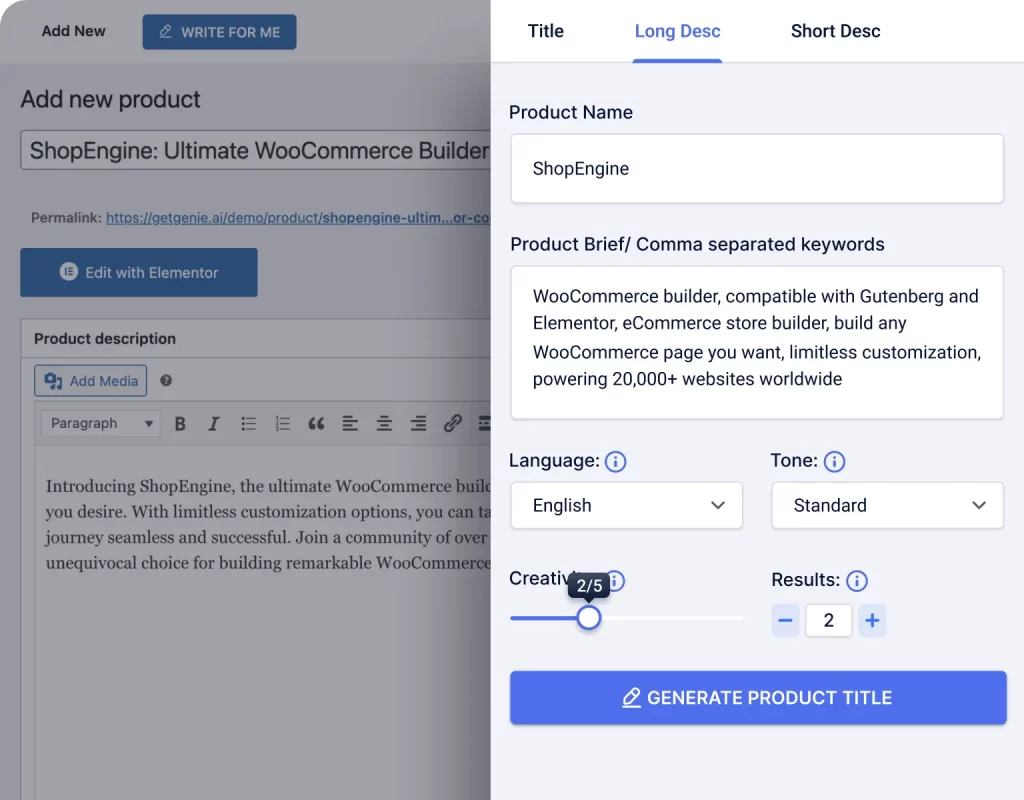
- Implement GetGenie AI WooCommerce templates to automate the creation of compelling and customized product titles and descriptions.
- Enhance product content workflow for consistent and engaging descriptions across your eCommerce platform.
- Ensure accuracy and relevance through template-driven approaches, saving time while maintaining quality.
✔ Landing Page and Ad Copy Generation
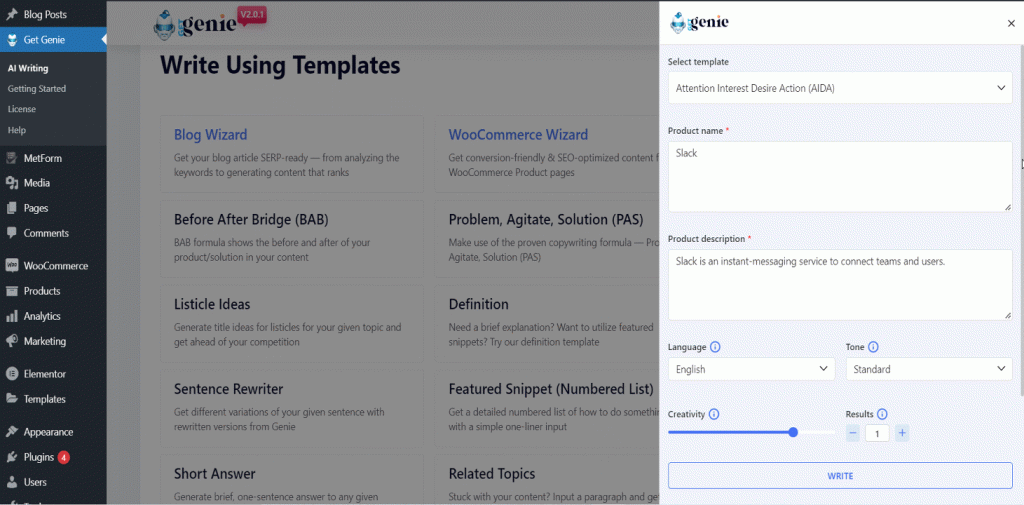
- Automate landing page copy creation using AIDA (Attention, Interest, Desire, Action), PAS (Problem, Agitation, Solution), BAB, etc frameworks.
- Implement Ad copy templates to ensure consistent messaging and optimize content for maximum user engagement.
- Increase advertising effectiveness by automating the generation of attention-grabbing and persuasive ad copies.
✔ Blog Post Automation
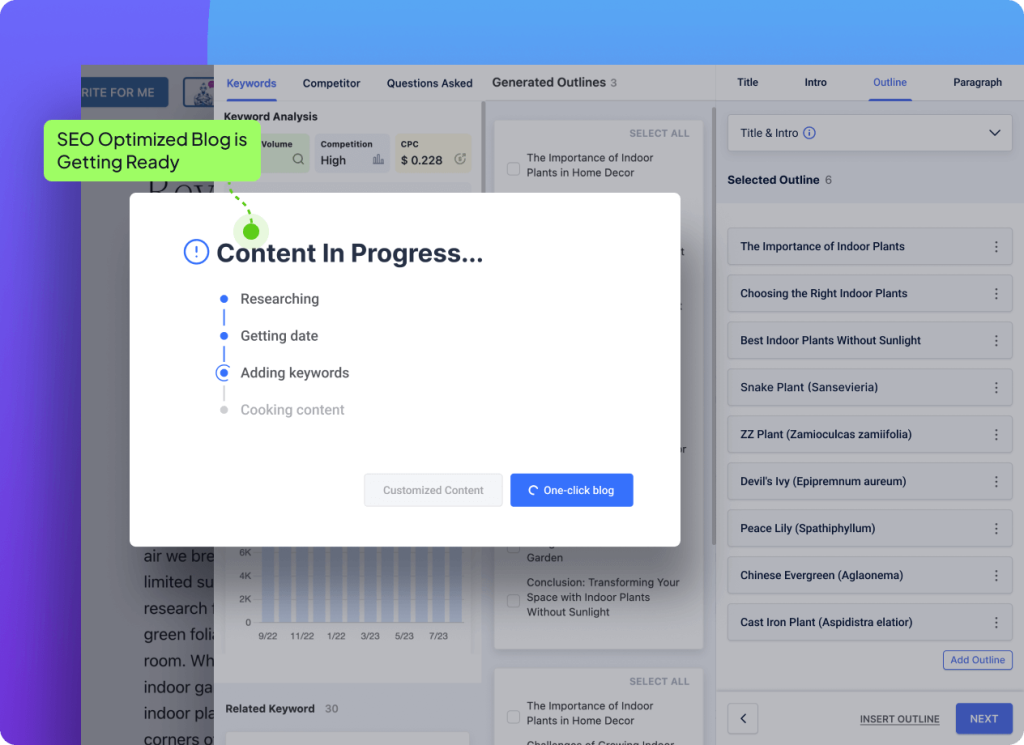
- Simplify the blog content creation process with a one-click blog feature, enabling quick and efficient generation of engaging posts.
- Enhance SEO strategies by automating the integration of relevant keywords and SEO best practices into your blog content.
- Ensure consistency in tone, style, and messaging across blog posts with template-driven automation for a cohesive brand voice.
4. Maximizing eCommerce Store SEO with AI Tools
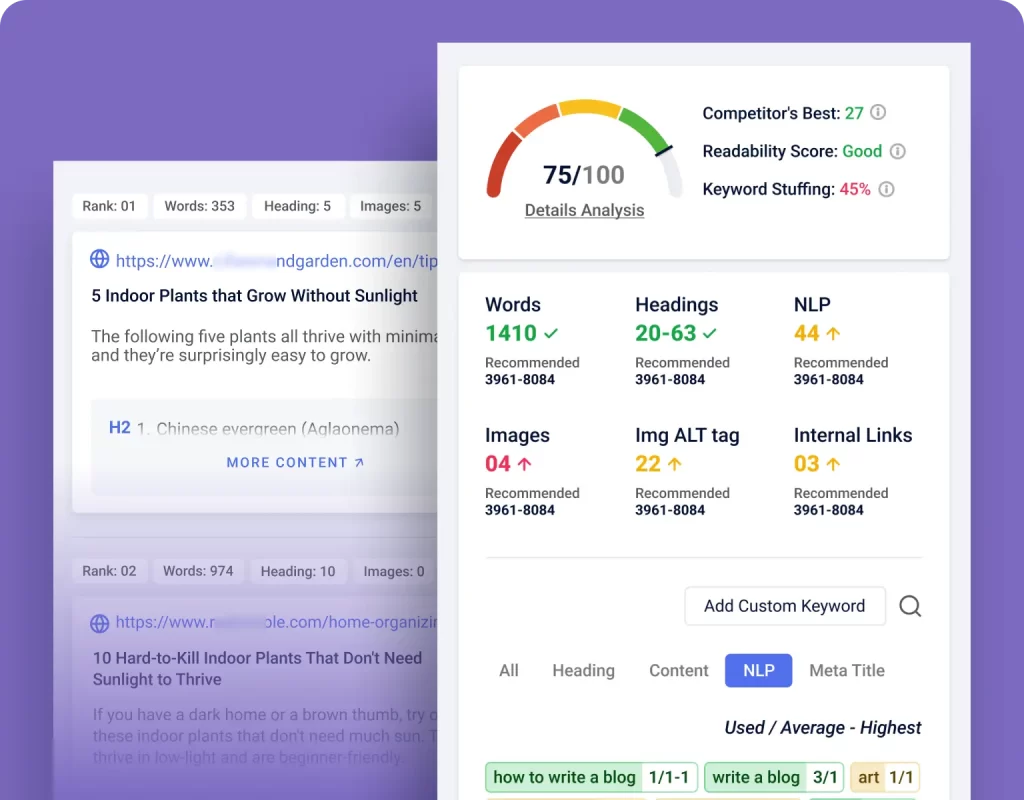
Enhancing your eCommerce store’s visibility is crucial for success. Utilizing AI tools for SEO optimization can significantly boost your online presence. Here’s a guide on maximizing store SEO with AI tools:
✔ AI-Powered Keyword Research
- Leverage AI tools for advanced keyword research e.g. GetGenie AI.
- Identify high-impact keywords relevant to your products and industry.
✔ Content Optimization with Natural Language Processing (NLP)
- Implement AI-driven NLP to enhance content quality.
- Make your content more appealing to search engines, improving overall on-page SEO and off-page SEO performance.
✔ Dynamic Meta Tags and Descriptions
- Use AI to generate relevant and SEO-friendly meta tags and descriptions.
- Ensure they remain relevant and compelling to both search engines and potential customers.
✔ Automated Image Optimization
- Employ AI tools to optimize images automatically.
- This includes compressing files and adding descriptive alt text, improving both user experience and search engine rankings.
✔ Predictive SEO Analytics
- Utilize AI-driven predictive SEO analytics.
- Forecast SEO trends, enabling proactive adjustments to your strategy and maintaining a competitive edge in search rankings.
5. Streamlining eCommerce Marketing
AI tools play a pivotal role in optimizing key elements such as CTA implementation, advertising strategies, and email automation.
Here’s how businesses can use AI for a more efficient and effective e-commerce marketing approach:
✔ CTA Optimization
- Optimize Call-to-Action (CTA) elements for increased engagement and higher conversion rates.
- Can perform A/B testing to find out which CTA can resonate with customers more,
✔ Email Automation Enhancement
- Integrate AI into email marketing for automated, personalized campaigns.
- Optimize timing, content, and segmentation to improve overall engagement.
✔ Smart Advertising Strategies
- Target potential audiences more effectively and dynamically adjust ad content for optimal performance.
- Gain actionable customer insights to inform targeted and strategic marketing decisions.
6. Managing eCommerce Inventory
Managing eCommerce inventory is also vital for enhancing conversion rates. You can revolutionize processes such as dynamic pricing, sales optimization, and real-time tracking with AI technologies.
Let’s Explore how AI enhances inventory management in eCommerce through the following key aspects:
✔ Dynamic Pricing Strategies
- Implement dynamic pricing, adapting in real-time based on factors like demand, competitor pricing, and inventory levels.
- Maximize revenue and competitiveness with automated, data-driven pricing adjustments.
- Consider market conditions and competitor pricing to maximize revenue and competitiveness.
✔ Sales Optimization
- Analyze customer behavior, predict trends, and optimize sales strategies.
- Enhance conversion rates and revenue by tailoring promotional efforts and product placements based on AI-driven insights.
✔ Real-Time Tracking and Inventory Updates
- Implement AI-powered systems for real-time tracking of inventory levels.
- Ensure accurate stock information, reduce the risk of stockouts or overstock, and enhance overall supply chain efficiency.
7. Enhancing Customer Satisfaction

AI technologies are reshaping the e-commerce business with innovative solutions like chatbots, visual assistants, and personalized product/service recommendations.
✔ Chatbot Integration
- Integrate AI chatbots like GenieChat, and ChatGPT, for instant and effective customer support.
- Enable seamless handling of inquiries, troubleshooting, and frequently asked questions.
- Enhance customer engagement by providing real-time assistance throughout the purchasing process.
✔ Visual Assistant Implementation
- Implement visual assistants powered by AI to increase the user experience.
- Facilitate interactive and visual guidance for product exploration and understanding.
- Enhance customer confidence by offering visual assistance in decision-making, leading to increased satisfaction.
✔ Personalized Product/Service Recommendations
- Deliver personalized product and service recommendations tailored to individual tastes.
- Increase customer engagement and satisfaction by presenting offerings aligned with their unique needs and preferences.
3 Examples of AI Technology in eCommerce
AI technology has become instrumental in enhancing user experiences, streamlining processes, and driving innovation.
Here are the 3 AI features implemented in each platform and the concise benefits they bring to the table.
Example 1: GetGenie AI in Content Automation
- Dynamic Content Creation: AI-driven algorithms based on 37+ templates of GetGenie can generate personalized and dynamic product descriptions, enhancing engagement in noth WordPress integration as well as SaaS version.
- SEO Optimization: GetGenie ensures that content is not only appealing but also optimized for search engines, improving discoverability through NLP suggestion and content score optimization.
- Multilingual Capabilities: Seamlessly create content in multiple languages(33+), broadening the reach of e-commerce platforms.
Example 2: AI in Voice Shopping with Alexa
- Voice-Activated Shopping: Users can browse, select, and purchase products using natural language, streamlining the shopping process.
- Order Tracking and Updates: AI-driven notifications keep customers informed about their orders through Alexa, enhancing post-purchase experiences.
- Voice-Driven Customer Support: AI voice assistants assist users in resolving queries, providing a seamless and hands-free shopping experience.
Example 3: Uber Matching with Machine Learning
- Real-time Traffic Analysis: Machine learning algorithms analyze live traffic data, optimizing driver and rider matches based on current conditions.
- Predictive Matching: Historical ride patterns and user behavior enable the system to anticipate demand, reducing wait times.
- Dynamic Pricing Optimization: ML algorithms adjust pricing based on demand, ensuring a balance between driver availability and user demand.
FAQs
Final Words
In summary, the role of AI has become increasingly crucial for both large and small eCommerce businesses navigating the complexities of operations.
The discussed 7 steps of deliberate incorporation on “How to use AI in eCommerce” is not merely a trend but a fundamental shift in how businesses operate and engage with their customers.
Besides, the introduction of innovative tools like GetGenie AI further underscores the potential for AI to revolutionize how we approach SEO and content creation in eCommerce.

